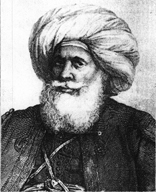Reflections
The Damascus Plot
The Modern-Day Blood Libel Administered by Egyptian, Syrian and French Forces, in the year 5600
Ever since the first blood libel against the Jews in 1144, the phenomenon became widespread in all of Christian Europe and was routinely used by priests and nuns. It was an easy way of diverting the public's attention from the corrupt authorities and fanned the flame of the already existent hatred toward the Jews, as the verse says: "It is a known fact that Esau hates Jacob".
The simple and uneducated people completely believed that the Jews were guilty of every unexplained murder. This fact served as an ethic and lawful legitimization to conduct pogroms against the 'cruel' Jews.
During the second millennium many blood libels took place, but only in Europe. It was therefore considered an innovation when a blood libel against the Jews occurred in the Arab world.
It happened in 1840\5600, in Muslim Syria.
One day, a Christian monk named Thomas and his Muslim helper disappeared from their residence in the city of Damascus. The monk was famous for his involvement in medicine, especially for the vaccines against chicken-pox that he used to administer.
The blame for their disappearance did not immediately fall on the local Jews. Firstly, extensive investigations were conducted, but after no traces were found neither of them nor their bodies, the French Embassy in Damascus decided to blame the Jews for their disappearance. Without hesitation, the Embassy turned to the authorities and informed them that the Jews had killed the two missing persons. Thus was the term 'blood libels' introduced to the Arab public.
Before any further investigations to confirm the Jew's involvement were conducted, a wild wave of arrests and torture swept over the Jews in order to have them 'confess' to the charges. Priests and Qadis held sermons that ignited the crowd's rage against the Jews, consequently leading them to penetrate the Jewish quarter and beat every Jew whom they encountered.
Two of the arrested Jews were tortured to death, while a third broke down and 'admitted' to withholding information about the missing persons. He gave the interrogators names of some of the Jewish leaders who, according to his forced confession, were guilty of the crime.
Two additional detainees converted to Islam to escape the horrible torture and were accordingly released from prison.
In order to add to the accusation of the Jews, an expert in astrology turned to the authorities and revealed that he had discovered the names of the murderers through his astronomical calculations. As expected, those were the names of seven notable and respected people from within the Jewish community. The Jewish leaders in Damascus turned to the Jewish community in London for assistance, as they feared a wave of pogroms not only in Syria, but in the whole Ottoman Empire as well.
The leaders of the Jewish community in London, Sir Moses Montefiore and Leone de Rothschild, turned to Lord Palmerston for help. The latter promised to intervene on their behalf and to speak to the Khalif of Egypt, Muhammad Ali, as well as with the authorities in Istanbul.
However, the leaders of the Jewish community in London did not rely only on the promises of the Lord; they assembled their own delegation comprised by respectable Jewish figures and educated and intelligent Christian notables.
In the meantime, the situation in Damascus was becoming more and more complicated. The Christian powers in the country found themselves in conflict. The Embassies of Austria, Britain and Prussia objected to the plot, while the French Embassy naturally supported it. With the purpose of reinforcing the Jew's guilt, a church in Damascus hung a sign at the gates of the church which read: "Here were the bones of Father Thomas of Sardinia laid to rest, after being killed by Jews on February 5th, 1840."
Both sides put immense pressure on Muhammad Ali so that he would declare the Jews innocent of the murder. They even threatened to withdraw their embassies from the country. Sir Montefiore presented the Khalif with a sealed letter from the British Government, which asserted him with the power of attorney to carry out his threat. Due to the pressure, the Khalif agreed to release the Jewish prisoners.
Sir Montefiore was appalled to see the word "pardon" in the release letter, a word that indicates that the Jewish detainees were indeed guilty of the murder. He therefore did not relinquish until the word "pardon" was omitted, and the words "respectable release" were added. Immediately thereafter, the prisoners were released.
In the meanwhile, a war erupted between the Ottoman Empire and Khalif Muhammad Ali, with their forces meeting on Syrian land. This, however, did not prevent the delegation to continue on its way to Istanbul, in order to obtain a promise of equality and justice for the Jewish population in the Ottoman Empire.
The Sultan himself submitted a "Firman" (authorization) to Sir Moses Montefiore, with a copy being sent to Chacham Bashi, the Turkish Chief Rabbi. In the authorization letter, the Ottoman Empire provided protection to all its Jewish subjects from any Muslim violence against them.
Sir Montefiore also attempted to obtain the Pope's approval of the Firman, however the Pope refused to meet with the special delegation, and the letter was handed to him indirectly through Cardinal Rivarola.
The infamous blood libel ended with the victory of the British delegation in the form of the authorization letter by the Ottoman Empire. However, the sign which was put up over the entrance to the church in Damascus – remained, and despite the efforts of Sir Montefiore to have it removed, it never was.







